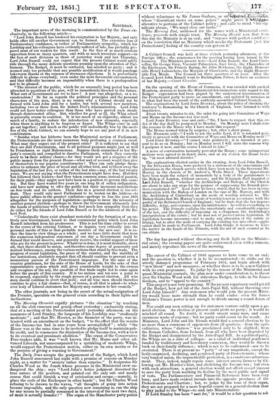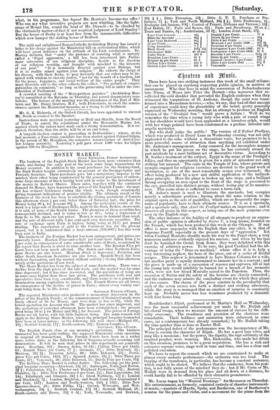The career of the Cabinet of 1846 appears to have
come to an end ; and the question is, whether it is to be reconstructed—to strike out its utterly damaged programme of February 1851, and begin afresh with "new blood " and new measures ; or whether there is to be a new Cabinet with its own programme. To judge by the tenour of the Ministerial and quasi-Ministerialjournals, the plan now under consideration is, to throw over Sir Charles Wood with his ridiculous Budget, to take in Sir James Graham, and to "appeal to the country." This project is not very promising. If the present copartnery could get rid of the Budget, how get rid of the Anti-Papal Bill, without throwing over Lord John himself ? Any statesman who would join the present Minis- try would loose more strength than he could confer : even Sir James Graham's Titanic power is not enough to divide among a round dozen of men.
Nor could any men setting up for statesmen venture safely upon a ge- neral election. An election at present could profit no party ; it would do mischief all round. No doubt, it would unseat many men, and cause enormous waste of expense ; but no party could count on the result. As Ministers, Lord John and his friends would find a general election to be no more than a summons of opponents from all quarters,—from the agri- culturists, whose " distTess " was proclaimed only to be slighted; from the Roman Catholics, from Ireland, from all who have been disgusted by the Budget and disappointed by the .Anti-Papal Bill. As a political party, the Whigs are in a state of collapse : as a cabal of individual gentlemen banded by traditionary and hereditary connexion, they would be thrown back on their family influence ; which is not to be contemned—nor to be overrated. There is at present no "party " of any nibgnitude, except the laxly-organized, declining, and perplexed party of Protectionists ; whose very bond of union, the impracticable protection, is a cumbrous embarrass- ment. They, indeed, might regain some interest among farmers by fol- lowing out Mr. Herrics's hint, and abolishing the Income-tax ; but even with such attractions, a general election would not afford enough:success to save the party from marking its decline by the most public and signal of tests. The Parliamentary and Financial Reformers have been very busy, and have made evident inroads into the opposite provinces of the Protectionists and Chartists ; but, to judge by the tone of their organ, they are not prepared for a more hopeful course in a general election than to play jackal to the Whigs—to sink into Ministerialists. If Lord Stanley has been " sent for," it would be a fair question to ask what, in his programme, lies beyond Mr. Herries's Income-tax offer ? Who oan say what inventive projects are now whirling, like the light- nings of Mount Ida, round the head of Mr. Disraeli—to be checked by the obstinately matter-of-fact if not sceptical judgment of Lord Stanley ? But the house of Derby is at least free from the innumerable difficulties which now hamper the sinking house of Bedford.



























 Previous page
Previous page